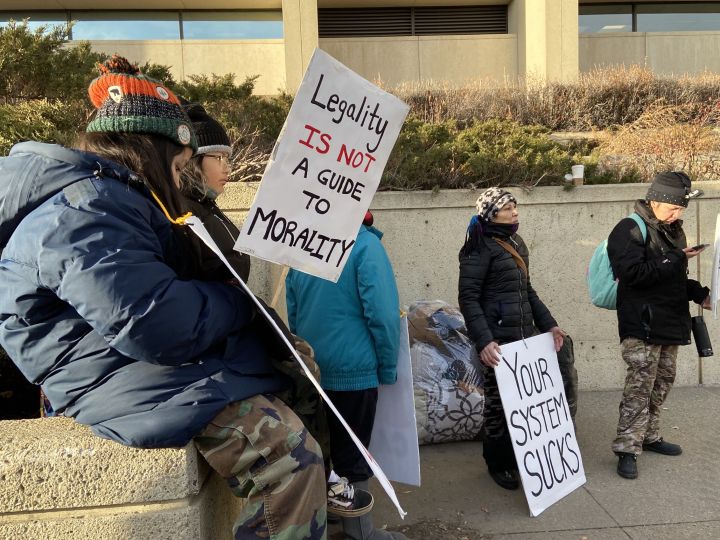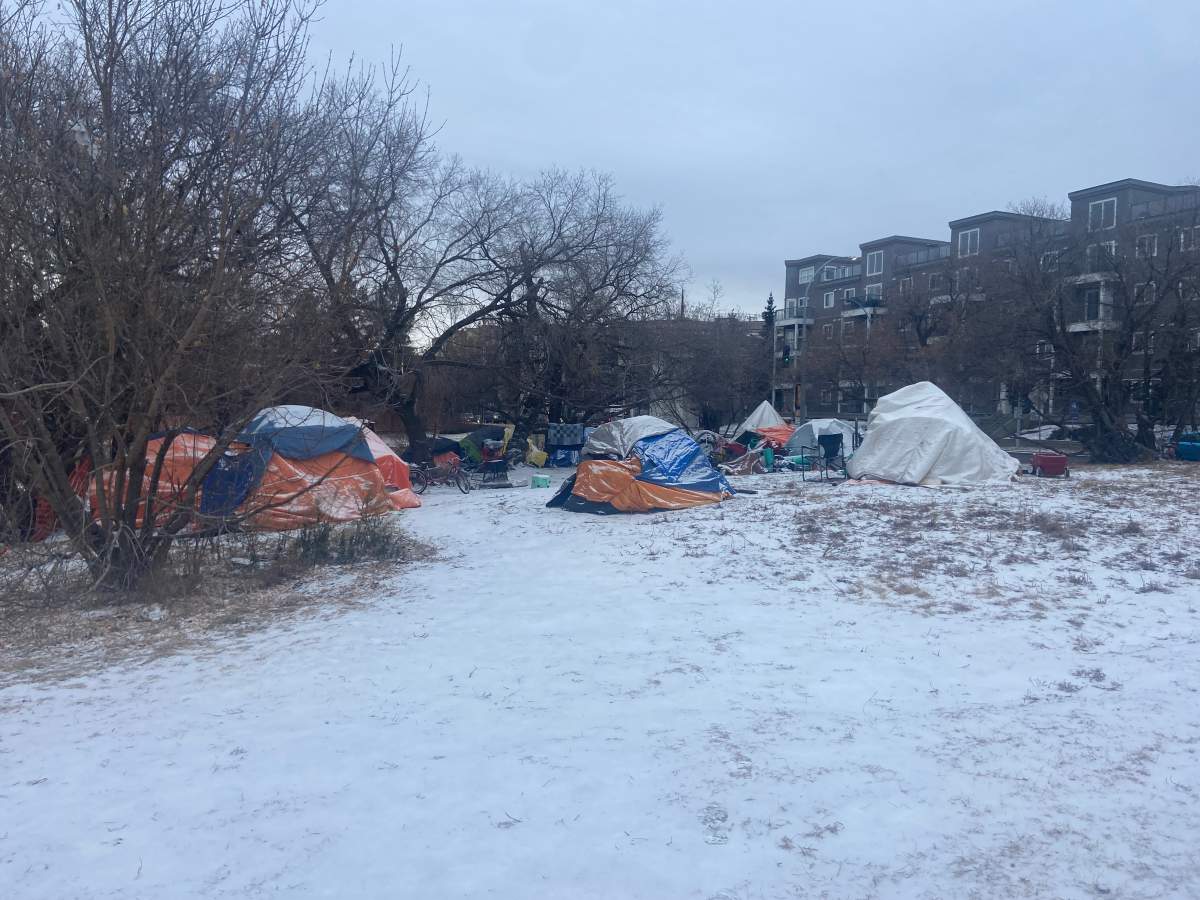An advocate for Edmonton’s most vulnerable says a recent court decision won’t change much in terms of how authorities respond to homeless encampments.

“I would say it’s business as usual. If you’re living in informal ways on the street or in parkland, you’re in great danger of having your shelter destroyed by the city and there’s no additional measures at all to provide more shelter space, day or night, there’s no new announcements coming from government to say we’re going to develop more housing for people,” said Jim Gurnett. “It’s pretty grim.”
Gurnett is part of the Edmonton Coalition on Housing and Homelessness. He also hands out emergency supplies and winter clothing about four days a week with his partners at the Inner City Pastoral Ministry.
“The number of shelter spaces is less than half the number of people who are homeless,” he said.
Homeward Trust said about 3,080 people were experiencing homelessness in Edmonton as of early November — 521 more than the same time last year. The group said Edmonton only has about 1,126 shelter spaces available.
A statement from the province on Friday said the Alberta government has provided funding for 1,700 shelter spaces. It anticipates Edmonton’s emergency shelter capacity will grow from 1,388 to 1,510 by the end of 2023 and to 1,700 spaces “early in the new year.”

Last week, several social agencies were notified about an Edmonton Police Service plan to dismantle and clean up eight encampment sites in and around the city’s core.
The Coalition for Justice and Human Rights sought an emergency injunction to delay this plan, which was granted. Then, in court on Monday, police, the city and the CJHR reached an agreement that allowed the eight camps that are considered a public safety risk to be taken down.
However, before proceeding with removing the eight camps, the city and police must issue notice again to the people living in them, as well as make sure there are alternative accommodations available for the residents.

Gurnett says giving 48-hours’ notice is one very small step and not nearly good enough.

Get daily National news
“It’s absolutely inadequate and it doesn’t meet accepted international standards of going after people’s places of life,” he said.
“It’s only in relation to those eight identified sites. It’s not a general rule to be followed. But what it says is that 48 hours in advance of dismantling any location, they have to let the people living there know and they have to notify nearby social agencies.
“There is lots of legal precedent that says that, in fact, if governments are going to tear down campsites where people are living, they have an obligation to fully consult with those people first… and they have an obligation to ensure there’s housing.”
Gurnett says when encampments are taken down, they typically re-emerge in the same place or another place as quickly as 24 hours later.
“There is no other option for these people. They are stuck and so they’re going to have to continue to do this if we don’t do something better for them.”
The pause will last until Jan. 11, when court will hear an earlier injunction application from the CJHR, which has launched a lawsuit against the city over its policy of removing homeless camps.

Bobbie Madge said she’s been sleeping on Edmonton streets since her tent was taken by police several weeks ago.
“I sleep wherever right now,” she said. “It sucks. It’s cold, really cold. We didn’t even get warned. They just showed up with a garbage truck and took all our stuff.”
The Edmonton Police Service said its protocol includes giving 48 hours’ notice for any encampment removal.
“What is it like starting your life over with absolutely nothing because they take everything?” asked Tyler Kahmahkoostayo, who’s also sleeping rough. “That’s happened 11 times now.
“It’s dehumanizing.
“There’s a lot we have to do on our part as well. I’m trying to get off the street myself, it’s really hard though. With the police, I would like to say: where’s the de-escalation skills? It’s great that we’re finally getting traction… It’s good to hear we have a voice and people are starting to listen,” Kahmahkoostayo said.
Mayor Amarjeet Sohi called an emergency meeting Wednesday with representatives from the Edmonton Police Service, city officials and community social service providers to discuss encampment response.
A news release from the mayor’s office said the group talked about including more social sector voices in planning and the need for “better communication and better coordination.”
“Our community partners raised important concerns and underscored that the entire social sector is facing extreme pressures,” Sohi said in a statement. “We all agree that encampments are a symptom of broader social issues, and not a safe long-term solution to houselessness. The city manager and I are committed to reviewing the concerns and suggestions raised by community partners today.”
The group agreed to meet again in the new year.

The Downtown Recovery Coalition has been focused on shelter capacity along with supports for root causes, like addictions and mental health, said Alex Hryciw.
“Part of our advocacy this year has been really focused on ensuring we have enough shelter capacity for everyone to kind of lay their head down at night somewhere safely,” she said. “Encampments are a symptom of a lack of shelter capacity and they’re really dangerous places.
“The RFP (request for proposals) that we saw from the province come out was great, we’re so grateful for that investment, but it was a little bit late. That’s why we’re kind of behind getting those shelter spaces up to speed.”
Hryciw said more visible police presence downtown is also going to help.
“Even to address perceptions of safety and security in the core,” she said. “We’ve seen investment into a lot of transit peace officers, HELP services, crisis diversion as well. We’re really pleased with the investments made so far. We want to see EPS deploy those beat cops really visibly downtown so when people are visiting for a game or taking in a dinner, they see and have that presence of law enforcement.
“We’re not going to take our foot off the gas in terms of advocating for shelter space capacity, for mental health and addiction capacity, but we do have a partner in the province for that and we’re really looking forward to working with them further.”
— with files from The Canadian Press




Comments
Comments closed.
Due to the sensitive and/or legal subject matter of some of the content on globalnews.ca, we reserve the ability to disable comments from time to time.
Please see our Commenting Policy for more.